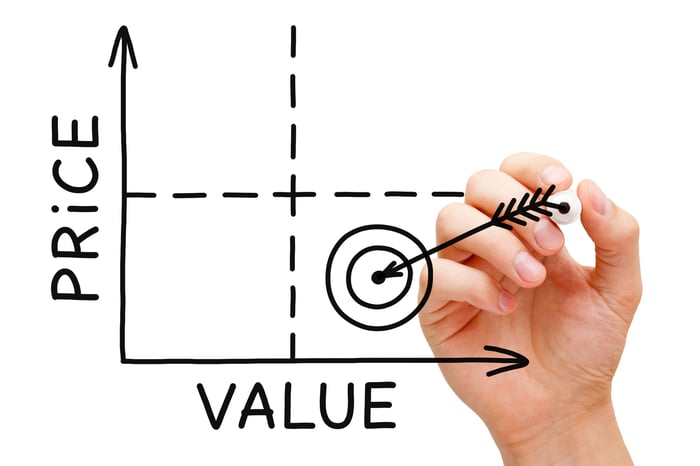When I look at my portfolio today, there are probably four or five names that would make my "cheapest stocks" list. Two are particularly interesting right now because of the impact inflation is having on their businesses: Hormel (HRL 1.39%) and The Kellogg Company (K 0.41%). Here's my thinking about them.
My personal value meter
When valuing a stock, many investors look to its price-to-earnings ratio. It's certainly a very popular metric. However, I prefer its relative dividend yield -- that is, its yield in relation to its historical range. The dividend yields of both Hormel and Kellogg are currently toward the high end of their ranges and thus are among the cheapest stocks that I own.

Image source: Getty Images.
Both companies are makers of packaged food products. This is generally a pretty boring and reliable sector of the market, but today things are a bit more complicated than usual. When the pandemic hit in 2020, their sales rose dramatically only to start cooling off in 2021 as lockdowns ended and economic activity began to pick up.
At the same time, inflation accelerated throughout 2021, putting pressure on margins as ingredient costs, labor expenses, and transportation prices all headed higher. Still, both companies are doing exactly what you would expect: working to pass their costs on to consumers. That's just normal business in the food space, but it takes time for the price increases to catch up to changing costs.
So on the whole, there's really nothing to worry about with these two iconic food companies; they are muddling through an odd and difficult time as best as you could expect. Plus, if you look at their two-year compound annual sales growth rates, both are actually doing just fine.
The value proposition
Of the two stocks, Hormel is probably the more exciting name -- and the one position to which I recently added. This company has a five-decade-plus history of dividend increases behind it (it's a dividend aristocrat), which is nice, but the real story is dividend growth. Over the past decade its dividend has increased at a compound annual rate of 15%. True, the most recent hike was a more modest 6%, but that is not shocking given the current headwinds, and it is still fairly impressive.
Right now, the stock's 2.1% dividend yield is toward the high end of its historical range. Before you dismiss the yield as too low, keep in mind that this is really a dividend growth stock. In fact, over the past decade the dividend has increased by nearly 250%!
HRL Dividend Yield data by YCharts
To put some numbers on that, if you had bought the stock at the start of 2011, you would have collected an annual dividend of $0.255 per share. In 2021, that number was $0.98. Back in 2011, Hormel's stock was trading around $15 per share, assuming you bought at the high end of the year's price range. That leads to a yield of around 1.7%. Today your yield on that purchase price would be 6.5%. That's the power of rapid dividend growth -- and why it's worth buying Hormel even though the absolute yield is on the low side compared to peers.
HRL Dividend data by YCharts
Kellogg is a bit different. Its dividend growth is slower, coming in at an annualized rate of just 3.5% over the past decade. But the current yield is notably higher at 3.6% and, like Hormel, toward the high end of the company's historical range, so it also looks cheap.
The really interesting thing here is that Kellogg basically completed a portfolio makeover just as the pandemic hit. Thus, the impact of the company's turnaround effort (selling slower-growing brands and buying higher-growth ones) has been hard to see. Given the broader backdrop, investors don't seem willing to give the company the benefit of the doubt even though two-year sales growth numbers are strong.
To be fair, a fire at a key factory and a strike at two others haven't helped investor perceptions. But like rising costs, these two issues will eventually pass (the strike concluded just before the end of 2021). All in all, Kellogg is a bit of a turnaround play that even conservative investors could confidently consider.
Nothing is perfect
Investors looking for value need to understand that there is no such thing as a perfect stock. Indeed, every company comes with some warts. For Hormel and Kellogg, there's a lot of noise right now thanks to the impact the pandemic is having on society.
However, food companies have long been able to adjust to the world around them, and these two companies appear likely to do just that this time around as well. For dividend growth investors, Hormel should be of interest. For those seeking to maximize their income in a low-yield world, Kellogg would probably be the better fit.







